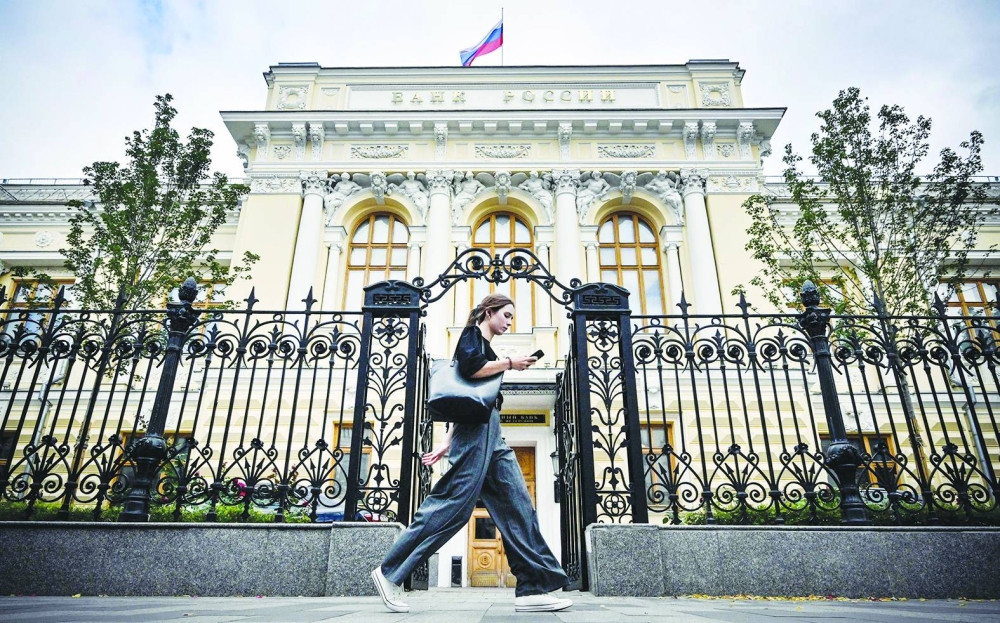Reuters
Moscow
Russia’s central bank raised its key interest rate by 100 basis points to 13% yesterday, jacking up the cost of borrowing for the third meeting in succession in response to a weak rouble and other persistent inflationary pressures.
A month ago, responding to the rouble tumbling past 100 to the dollar and a public call from the Kremlin for tighter monetary policy, the bank had hiked rates by 350 basis points to 12% at an emergency meeting.
Yesterday, it gave hawkish guidance that it would consider further rate increases at upcoming meetings and said inflationary risks remained significant.
“We raised the rate due to the appearance of inflation risks and will keep it at high levels for quite a long time, until we are convinced of the sustainable nature of the inflation slowdown,” the bank’s governor, Elvira Nabiullina, told a press conference.
In a statement, the bank said: “Significant proinflationary risks have crystallised, namely domestic demand growth outpacing output expansion capacity and the depreciation of the rouble in the summer months,” the bank said in a statement.
The decision to raise rates was in line with a Reuters poll.
Nabiullina said the board of directors had considered holding rates, as well as a more aggressive tightening step, noting that bringing inflation to the bank’s 4% target by end-2024 will require a higher rate trajectory.
Russia has gradually reversed an emergency hike to 20% which it made in February 2022 after Moscow despatched troops to Ukraine and the West imposed sweeping sanctions, bringing rates to as low as 7.5% this year.
But as a sharp weakening of the rouble fuelled inflationary risks from a tight labour market, strong consumer demand and Moscow’s wide budget deficit, the central bank has been forced into a tightening cycle that began in late July.
The rouble strengthened yesterday but gave up some intraday gains after the rate hike by the central bank, a move anticipated by the market as the country battles inflationary pressures exacerbated by its weak currency.
The central bank had hiked rates by 350 basis points to 12% at an emergency meeting last month, responding to the rouble’s tumble past 100 to the dollar, and most analysts polled by Reuters had expected yesterday’s increase.
But as the currency hit six-week highs early this week, some economists, including the CEOs of Russia’s two largest banks, had been leaning in favour of a hold.
The central bank adjusted its year-end forecast for inflation to 6.0-7.0% from 5.0-6.5%. Annual inflation was running at 5.33% as of September 11, above the 4% target.
Capital Economics said it was not convinced inflation would return to the bank’s 4% target in 2024, and expected more rate hikes to come.
“Russia’s central bank is a hawkish institution that takes its commitment to inflation fighting seriously,” said Senior Emerging Markets Economist Liam Peach. “With fiscal policy set to remain loose, the economy likely to continue overheating and inflation pressures to build further, there will be more pressure on the central bank to tighten monetary policy.”
The bank upgraded its 2023 key rate range forecast to 9.6-9.7% from 7.9-8.3%. It now sees this year’s current account surplus at $45bn, up from $26bn previously.
The bank kept its 2023 economic growth forecast at 1.5-2.5%, but warned the economy had now completed its recovery phase and that supply-side constraints, namely the tightening labour market, would limit further growth.
The next rate-setting meeting is scheduled for October 27.

A woman walks past the Russian central bank headquarters in downtown Moscow. The Bank of Russia raised its key interest rate by 100 basis points to 13% yesterday, jacking up the cost of borrowing for the third meeting in succession in response to a weak rouble and other persistent inflationary pressures.
